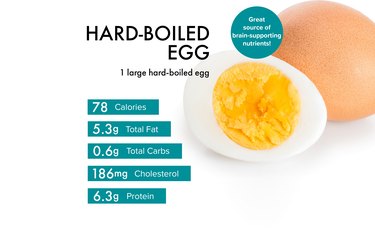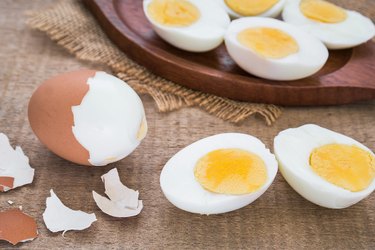
Eggs are one of the best foods you can eat for a range of nutrients and health benefits. And they're incredibly easy to prepare, giving you a healthy, portable meal or snack in minutes.
Another bonus: Because hard-boiled eggs are cooked thoroughly — no runny yolks here! — you'll have less of a chance of contracting disease-causing bacteria, according to a February 2015 paper in the International Journal of Environmental Research and Public Health.
Video of the Day
Video of the Day
Hard-Boiled Egg Nutrition Facts
A large hard-boiled egg is equal to one serving. One large hard-boiled egg contains:
- Calories: 78
- Total fat: 5.3 g
- Cholesterol: 186 mg
- Sodium: 62 mg
- Total carbs: 0.6 g
- Dietary fiber: 0 g
- Sugar: 0.6 g
- Added sugar: 0 g
- Protein: 6.3 g
Hard-Boiled Egg Macros
- Total fat: One large hard-boiled egg has 5.3 grams of total fat, which includes 1.6 grams of saturated fat, 0.71 grams of polyunsaturated fat, 2 grams of monounsaturated fat and 0 grams of trans fat. Most of an egg's nutrients, including fat, are found in its yolk.
- Carbohydrates: One large hard-boiled egg has just 0.56 grams of carbohydrates.
- Protein: One large hard-boiled egg has 6.3 grams of protein.
Vitamins, Minerals and Other Micronutrients
- Selenium: 28% Daily Value (DV)
- Choline: 27% DV
- Vitamin B12: 23% DV
- Riboflavin (vitamin B2): 20% DV
- Panthothenic acid (vitamin B5): 14% DV
What's the Deal With Enriched Eggs?
Some eggs may be enriched with omega-3s, a healthy polyunsaturated fatty acid. Omega-3s have been shown to improve heart health, according to the American Heart Association (AHA), and can help with brain function, according to an August 2018 paper in Current Neuropharmacology.
Health Benefits of Hard-Boiled Eggs
1. The Choline in Eggs Is Associated With Better Cognitive Function
Choline is an essential nutrient, which means it cannot be produced by the body — and it plays a significant role in promoting cognitive function. Observational studies found an association between cognitive performance in adults and higher choline intakes, according to the National Institutes of Health.
Egg yolks are the most concentrated source of choline in the American diet, providing about 27 percent of your DV per large egg.
2. Eggs Can Help Build and Repair Muscle Tissue
Our muscles need complete protein, which contain all nine essential amino acids, according to the Cleveland Clinic. One egg, hard-boiled or otherwise, provides roughly 6 grams of complete protein.
If your goal is to build muscle, aim to get around 1 to 1.6 grams of protein per kilogram (2.2 pounds) of body weight every day, a February 2018 article in the Journal of the International Society of Sports Nutrition suggests. (So if you weigh 150 pounds, that amounts to 109 grams of protein per day.)
Because eggs are a great source of lean protein, they can help build muscle tissue and help your muscles recover after physical activity. Hard-boil just two eggs and pair with a side of toast and peanut butter, and you've got your healthy post-workout snack of protein and carbohydrates.
Is it OK to eat hard-boiled eggs every day?
Yes, one egg a day is OK for most people to consume.
Does Boiling an Egg Affect Its Nutritional Value?
Heat is known to affect foods in different ways and has the potential to degrade beneficial nutrients. Indeed, certain nutrient amounts do change during the eggs' cooking process.
Lutein and zeaxanthin, which are two nutrients beneficial for your eyes, are found in egg yolks, according to a December 2012 paper published in the Journal of Agricultural and Food Chemistry. Boiling your eggs reduces the amounts of these nutrients, particularly that of zeaxanthin.
Because heat affects hard-boiled eggs' nutrition, soft-boiled eggs might provide slightly more nutrients. That said, eating eggs that are not fully cooked — soft-boiled, over-easy, poached, sunny-side up — could increase your risk of contracting harmful bacteria such as salmonella.
Tip
Cooking eggs with large amounts of butter and bacon on a daily basis, for example, is not good for your heart and cholesterol levels, according to the AHA. Stick to olive oil or avocado oil instead.
Hard-Boiled Egg Health Risks
Food Allergies
Eggs are one of the nine major food allergens, and by law, manufacturers are required to list eggs on nutrition labels as such, according to the U.S. Food and Drug Administration (FDA).
Allergies can start off with mild adverse reactions and then escalate to more severe reactions, including anaphylaxis.
Drug Interactions
Some vaccines contain egg proteins, and while rare, can trigger an allergic reaction, according to Drugs.com.
The seasonal influenza vaccine no longer contains egg proteins, according to the American College of Allergy, Asthma, and Immunology. It's important to speak with your medical team if you have an egg allergy.
How to Boil Eggs

Preparing hard-boiled eggs can be a lot easier than cooking other types of eggs. Here's how the American Egg Board recommends preparing hard-boiled eggs:
- Place your eggs in a pot of cool water (the water should fully cover the eggs) and bring the water to a boil.
- Once the water boils, remove the pot from the heat and allow your eggs to rest in the boiled water. Cover the pot. As long as you keep the eggs in a covered pot, they should cook just by sitting in the water.
- Let the eggs stand in the water for (see table below for the amount of time). Keep in mind that removing your eggs earlier will render them soft-boiled while leaving them in too long can overcook them.
Egg Size | How Long to Keep in Boiled Water |
|---|---|
Extra-Large | 15 minutes |
Large | 12 minutes |
Medium | 9 minutes |
Overcooked and incorrectly cooked hard-boiled eggs can have discolored yolks that are greenish-gray.
This discoloration is caused by an interaction between the yolk and egg white during the heating process. Essentially, iron in the yolk and sulfur in the egg white react to form iron sulfide, according to the University of Nebraska-Lincoln.
Overcooked hard-boiled eggs are safe to eat, but they don't taste as great and lose some of their nutritional content.
Hard-Boiled Egg Recipes
Alternatives to Boiled Eggs
If you have an egg allergy or follow a vegan diet, there are dozens of high-quality protein sources, including lean meat, nut butter and nuts, yogurt, cheese, quinoa, fish, beans and soy.
Tofu is a good way to mimic the protein and texture of hard-boiled eggs in sandwiches and salads, according to the Academy of Nutrition and Dietetics. To do this, dice extra-firm tofu — two ounces of tofu for each egg — and prepare like you would with a hard-boiled egg.
- International Journal of of Environmental Research and Public Health: "Salmonella and Eggs: From Production to Plate"
- U.S. Department of Agriculture: "Hard-boiled Egg"
- National Institutes of Health: "Vitamin D"
- American Heart Association: "The Facts on Fats"
- Current Neuropharmacology: "Impact of Dietary Fats on Brain Functions"
- Journal of Agricultural and Food Chemistry: "Effect of Domestic Cooking Methods on Egg Yolk Xanthophylls"
- British Medical Journal: "Associations of Egg Consumption With Cardiovascular Disease in a Cohort Study of 0.5 Million Chinese Adults"
- American Journal of Clinical Nutrition: "Effect of a High-egg Diet on Cardiometabolic Risk Factors in People With Type 2 Diabetes: the Diabetes and Egg (DIABEGG) Study—randomized Weight-loss and Follow-up Phase"
- American Heart Association: "Are Eggs Good For You or Not?"
- National Institutes of Health: "Choline"
- Nutrition Reviews: "Choline: An Essential Nutrient for Public Health"
- Cleveland Clinic: "Do I Need to Worry About Eating ‘Complete’ Proteins?"
- Metabolism: "Whole Egg Consumption Improves Lipoprotein Profiles and Insulin Sensitivity to a Greater Extent Than Yolk-free Egg Substitute in Individuals With Metabolic Syndrome"
- American Heart Association: "HDL (Good), LDL (Bad) Cholesterol and Triglycerides"
- Drugs.com: "Egg Allergy"
- American College of Allergy, Asthma, and Immunology: "Egg Allergy"
- University of Nebraska-Lincoln: "How to Avoid a Green Ring Around Hard-boiled Egg Yolks"
- Academy of Nutrition and Dietetics: "Egg Alternatives"
- Journal of the International Society of Sports Nutrition: "How much protein can the body use in a single meal for muscle-building? Implications for daily protein distribution"
- U.S. FDA: "Food Allergies"